#words that strengthen
Text
Decimation
Some members of one of the GIW’s top-secret research facilities have made an earth-shattering discovery.
They’ve found a way to make half-ghosts.
The failure rate is high. For every subject they successfully convert, many more are left burnt-out corpses—or worse, as rabid undead that must be put down with force.
It didn’t matter. The test subjects were cheap, worthless. Their countless deaths were an acceptable sacrifice in the name of progress.
Their operative’ deaths when they begin the full plan… those will matter more. Their warped agents may be more dangerous than normal humans in combat, but legions of foot soldiers still have their place. It would be foolish to leave themself solely in the hands of ectoplasmic entities, even if they’re allies and still partially human. Recruiting and training enough replacements to recover the losses would take time.
But it will all be worth it.
Finally, they will have control of a strong enough army to bring their goals to fruition. Those inhuman wraiths will be eradicated, ensuring the safety of the real, living humans and opening up a whole new dimension of untapped resources.
#danny phantom#dp#not specifically dp x dc but i feel like the “heroes vs GIW” plot type would fit really well#so i’m gonna include a few of those tags:#dp x dc#dpxdc#dcxdp#dc x dp#danny phantom au#dp au#danny phantom prompt#idk how to convey this but they still hate *all* ghosts#using half ghosts doesn’t change that#it’s seen as like. disgusting but necessary#i tried to use words with more negative connotations like “warped” or “more *dangerous*” to communicate that mood but idk if it comes across#dp prompt#guys in white#ghost investigation ward#giw (danny phantom)#i’m pretty proud of the title of this#like it’s not too deep but it feels sorta connected to two differen things through the two meanings of the word#romans had a practice called “decimation” which involved killing 1/10 the soldiers of a group as a punishment#and here the GIW are knowingly killing a portion of their own agents to strengthen their forces#(though it’s a larger fraction so if the “deci-” part were to be kept it’d be like “1 in 10 *survived*” instead of “1 in 10 died”)#and then they also intend to decimate the Ghost Zone (as in the modern meaning of “destroying much if not all of something”
234 notes
·
View notes
Photo


My reward for writing a 21-page research methods final and getting 100% on it <3
#sdv harvey#harvey stardew valley#sdv#sdv fanart#I know my arts kinda lackluster now but It's been a really tough year for me in every sense of the word#I'll try and re-strengthen my art muscles now that it's summer.
1K notes
·
View notes
Text
Relationship envy except I envy the bond between iconic fictional characters Sherlock Holmes and Dr. Watson
#their relationship is so beautifully made#your honor they're everything to me#it doesnt even matter if you view them platonically or romantically#you cant deny the love they have for each other#the way that watson writes about holmes is just full of love and admiration#even though holmes doesnt express his feelings in the same way#he still loves him more than anything#as seen in 3GAR and DEVI#they both love each other so much#they both strengthen each other you see#they protect each other#they're a team#they each bring something unique to the table#but it doesnt feel like one is inferior to the other#at least not to me#traditional relationships always make me feel like someone is inferior/weaker than the other#holmes is smarter intellectually and he's stronger physically#but watson has the emotional intelligence#they balance each other perfectly#theyre PARTNERS in every sense of the word#and i want a relationship like theirs#i feel like traditional gender roles and stuff limit me from having a real relationship like this#as a girl#im expected to be weaker and softer#i mean even sherlock holmes says women are weaker#for gods sake#i feel like i will never achieve this level of equal partnership with a man#sherlock holmes#john watson#holmes/watson
124 notes
·
View notes
Text
so there's been versions of horror that don't talk. versions of dust that don't say a word. but what about killer man. what if he didn't speak???
i need this man to do the most outrageous crazy and unhinged things while saying not a single word. i need killer sans to stand in corners and not say anything while observing other people (just like how some people depicts horror/dust,,,,) with the most expressionless face ever. the guy cannot feel i want his face to show that. he will murder he will steal he will bother every living being around him while not saying a goddamn thing. ACTUALLY i want his face not to move at ALL!!! this killer's face looks like the 😐 emoji but it has tears. idk maybe it's because if he opens his mouth he'll start leaking dt and he wont even be able to talk so its not worth it. or maybe a certain red eyed child or oily king ordered him never to speak unless they tell him to and now killer just doesn't speak. he doesn't even learn sign language or body language or does any physical cues (voluntarily) because that's considering "speaking". idk just ideas but i like the idea of the guy that does arguably the craziest shit to just. not speak. or have any sort of body language ever. he stands and walks like a robot only sort of personality that shines through is in fights. but even if killer doesn't talk and have any sort of physical presence people will still be able to tell what hes like based on his actions
anyways maybe i just need ALL of the mtt not to speak. yeah that seems cool. none of them speak they just silently beat each other up (killer is dead silent dust is violently signing and horror is making several indescribable noises. this is the most intense fight they will ever have)
#killer sans#dust sans#horror sans#im SORRY okay i refrained from using the word nonverbal because i reslly don't know anything about it#i didnt do my research on selective mutism or going nonverbal so ibREALLY tried not to say those words#incase this hc is just plain wrong or incredibly disrespectful. but i don't think so????#anyways i just think its a cool idea and the all non verbal fight i described in the end id HILARIOUS#i would pay to see that. mtt fight but they don't talk#can someone make a murder mute trio. a mute time trio. murder time mute PLEASE someone do mtt but none of thrm speak#i think (when theyre not fighting) a mute mtt would be so peaceful and chill#they have to rely SOLELY on nonverbal communication and that strengthens your bond way more than talking does#like they each have to learn each other's tells and what theyre saying without speaking. ultimate bonding exp#EXP? like like like (says dust. he need more LV)#i'm back i think. idk lets see if i can keep this streak going#bad sanses#bad sans gang#nightmare's gang#murder time trio#its not a hc because i personally dont hc killer (or any of the mtt as mute)#SO THIS IS A!#tricule rant
146 notes
·
View notes
Text
I mostly have a demon!Tim AU in my notes bc of stupid reasons like 'his split-toe boots look like hooves,' BUT I will say:
There's something to the idea of Tim hearing Dick say "I’m going to do my act — ‘specially for you. Be good now.” in ALPOD and interpreting it as an exchange, a deal (I give you my performance and in return you'll be ‘good’). And then sticking by it for the rest of his life, behaving for his parents and looking out for the city and keeping a close eye on Dick's own loved ones, until finally it brings him face to face with Dick once again.
When Bruce hears that a demon knows his identity and is angling to become the next Robin, he's suspicious of an ulterior motive — he doesn't expect the reason to be that Tim is oathbound to Dick. Despite his suspicion, he realizes that they are similar is some ways: both define themselves by a strict moral code, but in contrast to Batman’s, Tim’s is strange and subjective — to do good as he believes Dick would define it.
#tim did not HAVE to take dick's words as a deal but he did anyway#because dick was kind to him and demons are possessive#tim didn't want to let go of the boy who made such an impression on him so he tied them together for eternity#the tragedy that followed only strengthened his conviction#batman#dc comics#tim drake#dick grayson#bruce wayne#demon tim au
44 notes
·
View notes
Note
for the emojies ask... I choose red heart (what is their love language), for all the wakey wakey lords in "the after"
❤️ RED HEART - their love language(s)?
Nigredo - Words Of Affirmation
Albedo - Quality Time
Citrinitas - Acts Of Service
Rubedo - Physical Touch
This really applies to most stages of their unfortunately long, complicated lives.
#scp wakey wakey#scp au#scp 2264#scp#ask#greenghostlyjekyll#scp red lord#scp white lord#scp yellow lord#scp black lord#scp 035#alagadda sans masks#the amount of times i google info im sure i already know but not 100% know Just To Be Sure is too many#because of The Consequences. if im wrong i have to face the horrors of. a brief misunderstanding.#i kno peeps ship 035 and 049 and i do too in this Sometimes but for the most part theyre just Close but i mean the nickname starling kinda#always said with Love ya know and how he views doc ya know the admiration of his kindness and freedom#but but but hear me out nigredo and rubedo. agsjdkjs i i swear i have more coherent thoughts about this#let the words build over old bridges of trust and strengthen their bond. let him remember gentle intimacy#the peace of mind with vulnerable with someone you trust
31 notes
·
View notes
Text
This telepathic connection is getting stronger by the day.
It’s both exciting and terrifying.
#telepathy#connection#lha#How did you know that#words#reading my mind#reality#telepathic connection#see#intsa original#winds of time#quotes#strengthening bonds#electric#magnetic#connected#seeing within#1introvertedsage#healing#writing#learning#poetic
18 notes
·
View notes
Note
Hello! I've seen you around before but never really visiting your page and now i have! (✨I don't regret it✨)
I have an ask but I don't know if you're comfortable about it so answering it is a choice, not an obligation
Ask:
Why do you ship sns?
(i also ship it but i like to ask people what they think about it)
✨I’m very glad you have✨- hi~!
Yes of course. I talked about some of it here
There are quite a few of ships that I like, but I rarely talk about those. I know they’re just that— a ship. But even if there’s more to it… maybe? None of them come even close to the amount of wealth of supporting evidence that SNS holds to prove that yes, Kishimoto sat in front of a desk for 15+ years hunched over an entire love story, deliberately meaning for it to be romantic, but not ever really able to spell it out directly because… Shonen demographics. Probably. Mostly. And company decisions; alas the sequel. (That’s why I don’t really ship SNS, it feels off to me, I rather am a fan? Not important at all, just a distinction I’d like to make anyway.)
And at first it was mostly because other people claim their bond really is romantic through their observations. I wanted to find out for myself and coming to that conclusion took me a lot of digging. The more I did that, the more I started to like SNS, Kishimoto as a storyteller and ‘Naruto’ as a story overall because it stands out in ways other stories don’t.
But.. if you want specifics of my reasons story-wise.. (I will not apologize for the upcoming rant 🧡 you did ask me about SNS after all.. ’s what happens)— feel free to read further:
Major Reason 1— the Manga
Because how do you really start to see layers within a story that aren’t spelled out? I’ve seen some SNS-fans questioning their own beliefs and intuitions, but that’s not a bad thing, nor is it surprising. Kishimoto is a sneaky bastard and we love him for it, but I wouldn’t really agree with people saying how “easy” it is to see true meaning, because “it’s all so obvious” when ‘meaning’ isn’t really always. And it discredits the necessary skill and literary devices Kishimoto used to tell this story from his position as Shonen Mangaka imo. Severely.
Majority of me becoming a fan only started after reading the Manga. Here is where all the extra noise and influence in the Anime from the many (and often different) episode directors and other decision-makers, is removed completely. (I’m not saying that’s all done with ill intent, just, intent best suited for Anime goals that I don’t necessarily agree with in ‘Naruto’s case. I don’t really care otherwise.)
Manga vs. Anime:
In Manga is where all the Mangaka’s true subtext is and where their messages through the Theme are a lot more clear than when you view it through episodes. Each episode has separate goals not necessarily tied to the overall Story (like in Manga), but to structure it in a way that optimizes entertainment within the timeframe of an episode. It’s true art of deliberately selecting and stretching of source material.
People sometimes don’t believe me when I say that, because if you ignore fillers and the Anime covers the same things as the Manga, surely it won’t make a difference? But it really does. You can use all the extra elements in Animation to strengthen a message (like voice, action, music, pacing and camera-direction), but the opposite is true also. Even as “simple” as coloring can subtly influence subtext. You can use all the elements in whichever way to tell the story— together very powerful, but not all nearly as aligned with the Mangaka’s “truth”.
To test this out of curiosity, I have put the Manga and several episodes side by side and when you study a scene from the Manga (a case study), the underlying messages are sometimes completely removed in the Anime. Or other perceptions are strengthened by showing moments a character thinks back on to show what they mean with their words even if it’s irrelevant at the time. It doesn’t mean it’s not relevant at all, it’s just not the same thing as in the Manga. (I don’t recommend testing it the way I have because it takes an ungodly amount of time ><) And it’s only natural for the Anime to do that because… it’s literally their job to fill in episodes in a way they think is best and fits their goals with their audience in mind. Anime and Manga audiences aren’t the same even if someone belongs to both. This is true at least in theory and from my understanding talking to animators when I traveled, they aren’t treated the same if you compare strategies.
That’s also why saying Kishimoto helped with certain movies or his approval of whatever doesn’t say too much (or at all) regarding his personal vision regarding the source, because the execution of the final product has too many elements that have nothing to do with his role or skills in the project, whereas that’s completely different with the Manga. It’s fairly obvious in ‘Gaiden’ and Minato’s story as well. Yet his name is always used to prove otherwise because it’s a marketing tactic and it (unfortunately) works.
Major Reason 2— Subverting Expectations
It’s true that a lot about SNS and their bond is just blatant text and spelled out directly making them both sound incredibly insane and incredibly in love. Meaning, that even if you would watch the Anime or read the Manga on a surface level— you’d realize there’s something more going on regardless. If you question whether your intuition is true on this, watch any reaction to certain moments— you’re not alone. It isn’t for nothing that majority of the general audience mockingly calls Sasuke ‘Sasgay’ since the beginning or are only able to filter an opinion about his motivations through what the surface-narrative says it is: bad. (We can talk about that more in a different post.)
Or people hate Naruto for prioritizing something other than his protagonist’ self “should” prioritize; what is narratively seen as “good”. (Konoha for example. Often why people put Konoha vs. Sasuke when there’s a lot more to it and categorizing it as such only enhances that surface view of good vs bad— it works against the argument these people try to make because that automatically puts Sasuke in the bad-category for most people.. ’s kinda funny, but not really.)
Or how there are complaints because neither Naruto or Sasuke have shown even the slightest interest towards their ‘supposed’ (read: Shonen-‘expected’) love-interests because there isn’t any. Arguing that they should love another character simply because the girlies are stalking and fawning over them holds no ground at all, yet people take it as truth because they don’t know where else to look. To accept or even acknowledge the unexpected means you gotta swim a little deeper to explore the rest of the iceberg. (Yes, ‘Naruto’ really is that special.) If you don’t then it’s pretty easy to blame everything on bad writing, but I don’t think that’s fair at all simply because some people are unwilling/unable to actually see what’s truly written in the first place and can’t connect things otherwise because “no that’d be gay” and “it’s not possible, it’s Shonen so the Hero should fall in love with the most obvious girl-option” despite there being no mutual foundation to support a decision like that. Nor is there any significance that contributes to anything else. (Or in ‘Naruto’s case, Kishimoto mocks the idea of them liking these girls back, which should tell you a lot as well.)
Major Reason 3— Subtext, Plot-Goals & Theme
So alright, there’s text. There’s them giving up their goals for each other, willing to trade their lives for the other’s wellbeing or dreams, wanting to understand and reach hearts being each other’s one and only’s in different ways as well as driving strength, motivation and the cause of inner conflicts… but all of its meaning is found in context. (Yes, that thing that people love to ignore to make up their own.) The foundation of SNS’s bond and what it means to them (and even other characters) is primarily subtext weaved through their character arcs. Their change as a character has all to do with each other and very little with the actual plot, hence their final battle being an emotional one and more climactic (in theory of storytelling) than the actual war.
And yeah, possibly the reason why no one could really connect with the war was because it actually had little meaning beyond the surface.
Naruto was already celebrated as future Hokage and got the acknowledgement he believed would make him happy. But it didn’t, not for long.
Sasuke killed both his brother (sorta) and Danzo. He had the perfect opportunity to demolish Konoha because he believed that would be the solution, but he didn’t. Because he realized he had to question the former Hokage and learn more to tackle the problem behind his suffering (the system) on a larger scale. (Revolution.)
These things by itself should tell you there is more to it, because had it been any other story, it would’ve been over. It’s the entire revelation that halts a story completely, but it went on didn’t it? The war only strengthened Sasuke’s resolve for his plan for revolution (we can talk about that in another post) and Naruto’s status as Hero is conflicting and can’t actually ever soothe his anger (in fact, you can see during the war that it became worse) which is why Kishimoto sorta lamely (I’m sorry) brushed the problems off during the Waterfall of Truth arc… by having Naruto believe in himself (which he already did) for arguably the wrong reasons. Although admirable and touching, it’s not very believable considering the rules Kishimoto set before.
So, their arcs continue and the characters have to keep growing. As Main-characters, it’s saying “you aren’t there yet, there’s something you have to discover still”. It isn’t “anyway, you still have a war to fight”, because the war isn’t an obstacle to their inner needs. It’s plot conflict mostly. When it comes to Naruto and Sasuke, Kishimoto masterfully used plot conflict between each other as an obstacle to represent how they feel. Naruto’s existence really is an obstacle to Sasuke’s goal, but you gotta wonder why exactly that is. Naruto couldn’t ever become Hokage if he couldn’t save a friend, but if that’s true, then Naruto failed long before that, so why is Sasuke so special, huh? Hehe.
On top of all that, overcoming these obstacles means they have to fight for it— emotionally and literally. And fight they do, which is why it is so emotional, because it’s both. The discovery lies in acceptance, something a character can’t go back from in a good story and it’s very prevalent during their conversation after VotE2 and Sasuke’s inner monologue at the end. They are each other’s answer to the Thematic questions the story posed in the beginning. These aren’t “can Naruto become Hokage?” Or “Will Sasuke decide to destroy Konoha?” Or “will our heroes be able to win the war?”, those are plot, not Theme and they don’t argue for a Universal truth nor does it repeat throughout the story constantly like their bond is. It's why Sasuke's "I've lost" has nothing to do with giving up the reason behind his goal, nor the physical fight they just had.
Together it creates a promise saying their understanding is the solution to the Narutoverse’s problem we unfortunately weren’t able to see in action because it jumped from that to delulu lala-land. But that didn’t make the former any less true.
Because if it wasn’t, then Kishimoto spent 72 volumes proving a message he never intended to prove which is ridiculous. As is saying that doing so is accidental (lmao).
And come on now, if their love for each other is the growth within their Character Arcs, the answer to the problems the Theme and Plot posed, both supported by Context and Subtext with some insane blatant Text on top, then I’m sold completely.
Ooohhh and don’t get me started on the insane amount of symbolisms and metaphoric elements and how Kishimoto used minor characters to support and deepen its meaning because I'll be typing forever... ><
#asktamelee#sns talk#manga talk#story talk#I can say more but I think 2000+ words should be enough for now ><#and yeah we all know all the sns-moments#but I like viewing it through the elements of story because I think#personally#that it strengthens the overall argument#which is a win-win
20 notes
·
View notes
Text
I am a disgusting excuse for a human being, a monster in sheep's clothing.
#the intrusive thoughts are so strong today#and no i wont be saying specifics beyond this#but i cant shake them with any of my normal methods#which only strengthens their message#brain drain#word vomit#chill pill#so much self hatred
20 notes
·
View notes
Note
Don't think I ever explained it, but the reason I like SWK accidentally killing Mac so much isn't actually for the whumpy apologies, tho the confrontation of it in fics is always so delicious, but what has me going insane is actually the layers of their relationship breakdown. Like, you have these two immortal monkeys, they are perfectly designed by fate for each other's companionship. There is genuine care there, and it never dies. Never. They were just torn apart so tragically. Nobody fell to the dark side, there was no jealousy, no hatred. There was just every manifestation of grief and miscommunication. You could never get the right words out. You couldn't help what came out of your mouth in that moment, the bitterness you would have swallowed back in for just one more morning of peeling tangerines in the summer breeze, all the quiet ways to say 'I love you.' Their break-up was like shredding bamboo, the faults and woes, the insecurities and failings, and the hurtful words and the entrapment and all the ways you can't reach, and the loss of everything and the denial and oh, the time just wasn't right, it all boiled over, and speaking a language that can no longer be heard, and the shattering of unconditionality. They had their own flaws, that you never could have thought would tear them apart, but it did. And they had to go on their own journeys of self-growth, had their own people and places they were devoted to, they were the only ones for each other, but they were not only meant for that. And goodness, was it the wrong time. Wukong, trapped, the loss of freedom he fought for, to be the strongest so he could be free and happy, and everyone else too. Macky, constantly grappling with having to follow the sun-streaked trail Wukong blazes, even the moon unable to pause the day unless the sun chooses to set in its ambition to climb higher into the sky, never coming down. The accident of it all? Even if Swk never did, the "did you think all this time, that I could kill you just like that? like you meant nothing to me?" is going to be SUCH a good broken, grief-stricken line delivery from Wukong. But if not, then ooh, the exploration for those who have a similar anger they try to control, when they release emotions externally, and might accidentally break something, those moments don't define you, but how could you undo the damage, how do you make it normal when its not an object you broke, you hurt a friend, it was you, but it also wasn't you had it only been, what if what if what if- if only, and that's a very basic explanation, and even I can't get all the words down right, but its just a realistic thing, how it all fell apart, I think. that conversation has layers, even if I explain it poorly XD you could grab every tragic tumblr post about fading friendships, and love metaphors with sharing quiet spaces and fruit together, and it could be them. also the "came back wrong" trope potential with Macky, ooh. is it him. despite everything, are you still you, could you ever be. are you the same person killed long ago, is this for the best, or shall we both start over again? can you be recognized underneath it all, and is that tragic or a second chance.
god they have so many layers and one of the cool things about lmk keeping Macky’s death and the specifics of shadowpeach’s relationship vague is how much nuance and subtext is left in there. you can peel back layers upon layers and pain upon pain and bond upon bond and still find new info and interpretations and nuances and—
I know you’ve seen me gripe about not being given enough info, but i do really enjoy it when the story allows us to infer and think deeply about certain aspects of the story. I like it when a story isn’t 100% clear or honest to the audience because that leads you to look deeper. think deeper. and try to fathom all the clues brought to you
(but i gripe about it because i’m inpatient af and like having all the pieces right in front of me. there are so many threads and plot theories i have on my little conspiracy board that i don’t want to touch just yet because i feel like i need more pieces before making a confident analysis)
another thing is that both swk and Macky are unreliable when retelling their past. they have their biases and emotions that are tied to the memories. however, swk omits the truth more than outright lies while Macky cannot keep his emotions away from skewing the past. and then the clear truth comes out when it’s forced out from them (think Samadhi fire and scroll memories)
(then again, swk doesn’t really say much of his past and likes to keep it brief. out of the two he is the most honest in terms of he’s self reflective and understands that his past self has issues. is he completely honest about shit tho? no but we’re talking about shadowpeach)
and the cool thing is that “the love was still there” in the past and even when both were on opposite ends. both monkeys were falling into a darker path and while they had communication issues the love was still there. and even while they fought under the mountain and even when they probably fought during jttw, the love was still there
but neither had the tools to save each other and neither really knew how to stop each other from their doom and isn’t that such a beautiful thing to analyze and think about on the screen?
#idk i just really like pairing where even tho they failed each other the love was there#even when the love was dying out#even when it was now kindled with hatred and betrayal#those can only be strengthened by love and so it was there#and there is something so fascinating about watching a pair with such a huge relationship baggage fall apart and be at odds & then try agai#yeah#idk if i said all the words i wanted but there ya go#lmk#shadowpeach#asks
18 notes
·
View notes
Text

#ryuuji suguro#ryuji suguro#ao no exorcist#blue exorcist#suguro ryuuji#bon suguro#suguro ryuji#manga ryuuji#chapter 58#flashback ryuuji#shimane illuminati arc#aria ryuuji#konekomaru miwa#you can see here that ryuuji is incredibly driven in proving himself and that Konekomaru's words#which everyone else more or less just shrugged off and moved on from#really stuck with ryuuji and that he's been thinking over them#they're going to keep being a driving force for him#and i love the way that his words encouraged and strengthened Konekomaru and gave him confidence he could do it#where Konekomaru's cut Ryuuji and are making him fight to try and prove them wrong
10 notes
·
View notes
Text
disorganized honest thoughts on angeal and genesis
Read someone's view on crisis core as "a strange game where I only remembered charas from ff7 proper". And I thought to myself. that is an accurate review.
really long ramble-y thoughts from a person who has not kept up with ff7 past crisis core under cut you have been warned
-------------
I have learned to like both of them quite a bit after rolling them around in my head for several years, but on first playthrough I did not like angeal or genesis. and I don't think back in a "what a fool I was" way. I think my original view on the two is actually still valid. I think angeal and genesis are both pretty badly written and have very little substance in game.
I understand the limitations of the psp greatly restricted the amount of story they could cram in. but then you write a different story or change your game system. This is not a valid excuse.
My understanding of how they WANTED to position the characters is Angeal, zacks' heroic ideal, a bar for him to gauge whether he's made it or not. While sephiroth was genesis'?????
because angeal barely spends any time NOT in the opposition, or even coming UP in conversation I really can't tell.
Genesis was positioned to b a foil to zacks. which still rings true in crisis core, but not straight forward enough???
Both Genesis and zacks were fixated on being a hero. I could see it being a clash of ideals. "what is a true hero" type thing. but in that case genesis being a peer of both angeal and sephiroth makes the connection muddy.
This is just a completely biased counter suggestion to the story we got but:
-
I feel like we could have gotten more bang for our buck if genesis was actually a peer of zacks, maybe even excelling where zacks was not, but feels threatened by the growth zacks is showing empowered by his sunshine puppy attitude. Both look up to sephiroth.
genesis continues to idolize sephiroth even when sephiroth proves to be not as perfect as advertised, while zacks has his qualms. it's about becoming a hero for zacks while it's about becoming sephiroth for genesis.
Later there is some drama surrounding who gets promoted to class 1st ( only zacks / only genesis / both but genesis causes some trouble and has to leave etc etc)
zacks and genesis eventually have to duke it out one heroic ideal to another. zacks wins -- we still get basically the same conclusion we got at banora in crisis core proper.
-
You might have noticed this suggestion is Angeal-less. While Angeal is probs one of my fav of the charas introduced in crisis core he did not need to be there methinks. (save on disc space, leave him on the drawing board) HOWEVER In my haphazard suggestion above, maybe it could have been that zacks idolized angeal while genesis idolized sephiroth -- the two class 1sts. But for whatever reason angeal has an "accident", that way sephiroth can still have his "oh no all my friends are gone" dilemma. and a good reason to start going down a dark path.
Meanwhile Genesis had more of a reason to be there -- it's 2007 and GACKT is RIGHT THERE jk jk -- Zacks needed his own foil. that said this "Angeal maybe didn't need to be there" opinion is a bit colored by how square has handled zacks throughout the years. Positioning sephiroth as his heroic ideal over angeal. However even in game they didn't really paint a clear picture of how Angeal was zacks' mentor.
Everyone knew the PSP has limited resources throwing new characters at the problem was kinda a bad solution.
I say this having actually loved playing the game, and knowing full well if they actually did something like what I wrote above I might have enjoyed it less. who knows, nagging about a story that's already written is something nerds(me) do to fill the void in their hearts.
anyhoo have nowhere to put my thoughts so putting them here.
#feels#if not abundantly obvious I like both of these chars btw#normally i'd draw stuff for this#feels like cheating#but also like I am not communicating clearly#just dumping it out in word form lol#anyhoo#this is just random thoughts#wait actually this is getting embarrassing#what am I doing#might delete#crisis core#zacks fair#I didn't really touch on this in my suggestion#but we could have left genes!s on the drawing board too#like strengthen the story of the pre-existing charas#rather than make a bunch of new charas to not flesh out#you know?#I don't know#to be clear I’ve played reunion too#just meant story wise I dunno anything past ff7 ffac and crisis core
15 notes
·
View notes
Note
Freenoodles? (they are so important to me)
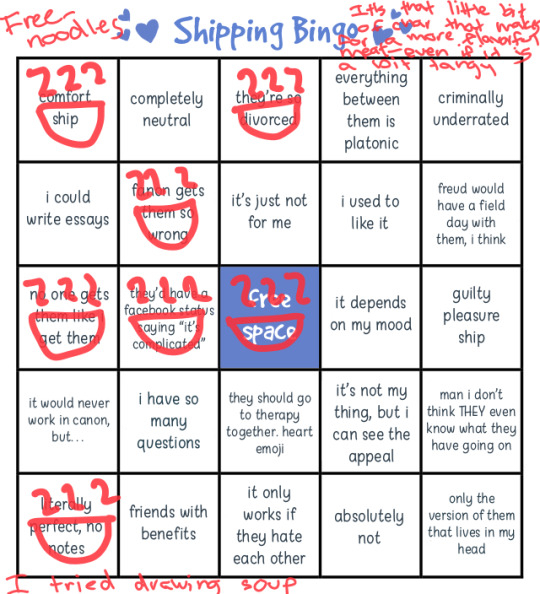
FREENOODLES IS ICONIC. Such an old married couple, who doesn't love them. "I've devoted my life to this man" you sure have dude
#they love and support each other. yet they do NOT stop bickering#and they like...have totally different love languages me thinks#Pigsy likes quality time and acts of service while Tang is much more gift/ words of affirmation oriented#To me they are like...''imperfect people are worth fighting for'' the ship.#Like they both have their flaws and annoy each other in plenty of ways but when it comes down to it they are there for each other#In the past their relationship was a lot more rocky than it is now I'd say. The events of the show strengthened their relationship#Especially in 2x04. OMG Tang you were there for Pigsy when it mattered the most!!#Also I love 2x04 and 4x04 parallels#lmk#lego monkie kid#freenoodles#shipping bingo#asks
30 notes
·
View notes
Text
I have Teshvo questions. For one : what is the sound difference between CH and SH. I am also wondering about the origin of the letter H and what its purpose is. I see how it affects the sound in words like Zargothrax and Ralathor but what about Mezchinhar? I might be mistaken but it is silent when I pronounce it there. Is it used solely to get another sound (from C to CH, S to SH)? What sound do we get from N to NH then. Or is it the residue of an old spelling/pronunciation that evolved? Is it to signify that there was something else there before (like the french ^ replacing the old french s)? Or maybe that is the old spelling but the pronunciation evolved and not the textbooks?
@blastedking I know you have answered some of my Teshvo questions before but it's just so fascinating discovering new languages.
Also the pronunciation of Mezchinhar has fully changed to the correct one :) and it sounds so soft ! I know we talked about Teshvo having a more german/Russian sound and harsh tone but it's so soft in my mind between the actual pronunciation of Mezchinhar, Ralathor and Zargothrax
Oh yes! Important one ! (Guy who has only ever learned czech as an eastern European language) I'm getting real czech vibes from the Je/Ja/Jax so I was wondering if it borrowed their pronunciation of the J as well or if it was the english J (dj) or the french J (flat j).
#I've also been having a lot of fun figuring out the writing system#I loooved the explanation for words like Mezchinhar and Mezdovat#Also I might have spoiled myself with a few words BUT it confirms my theories or at least#strengthen them so I'm not mad haha#Also Nicki Minaj was a wizard all along 🤯#Teshvo#Universe law of fire
5 notes
·
View notes
Text
Fanfiction is fun to write. It’s fun to read as well ofc but it’s fun to write because it’s a low-stakes way to try out new styles/scenarios, you don’t have to character build you can just put some guys in situations, and you don’t even have to world build if you’re staying true to canon. You literally just get to pick up a character you like and say ‘we’re doing this today’ and I think that’s beautiful.
#don’t ever let anyone tell you that writing fanfiction isn’t real writing#it’s as real as it gets because it comes purely from a need to hang out with a friend#it comes purely from love and enjoyment#and it’s FOR other people to love and enjoy#and yeah sometimes the thing we’re doing today is hanging the guy upside down and whacking him with a broom but that’s okay too because#we’re exploring themes and styles and wording and nothing#I mean NOTHING strengthens your writing like trying things and exploring things
13 notes
·
View notes
Text

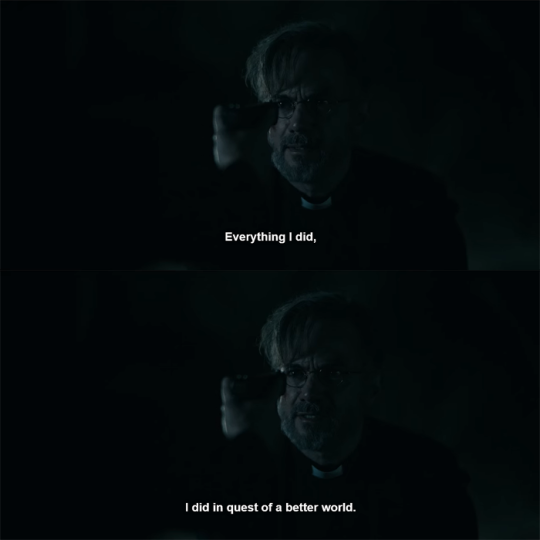
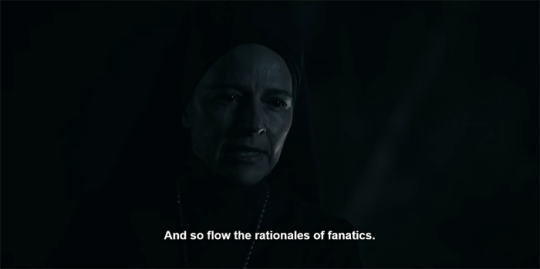
It might appear somewhat essentialist at first if used to examine real, breathing human beings, but Carol Gilligan's "Images of relationship" can provide an interesting framework with which to understand certain facets of Warrior Nun. More so when coupled with David Hayter's comment on how the show's "women are always right and the men are always kind of screwing things up," for her article, dealing in systems of moral understanding, might point us towards the reasons behind this openly admitted narrative "bias".
In a nutshell, Gilligan observes the different strategies by which boys and girls seem to resolve moral dilemmas, deviating from traditional interpretation. This is because, Rosemarie Tong reminds us, "Gilligan challenged the Freudian notion that men have a well-developed sense of justice — a sense of morality — whereas women do not". By looking beyond these hurried and prejudiced conclusions of (male) researchers before her, she "argued instead that men and women have different conceptions of morality, each equally coherent and developed and equally valid". She bases this idea, then, on those resolution strategies that were found to consist of, for boys, a tendency to see the moral dilemma as "sort of like a math problem with humans", while the girls were more inclined to view it as "a narrative of relationships that extends over time" — so if boys seemed "logical" through their impersonal abstraction of a situation, invoking concepts similar to those of law and justice, the girls were more likely to follow a different, "personal" logic, through "an awareness of the connections between people", identifying "a web of relationships that is sustained by a process of communication".
Where this all intersects with Warrior Nun is that the male and female characters seemingly display these same propensities of moral judgment.
If we start with the men, we will quickly see that they are all caught up in their own abstract systems, prone to grand ideas and concepts while detached from the world and the valuable human bonds that make it up, just as Vincent sees the quest for a hypothetical "better world" as more important than the life of a very real, concrete woman he claims to love. Mr. Hayter himself, in the same interview conceded during the OCS Conclave of June 3rd, mentions how father Vincent and cardinal William are irresistibly attracted to the notion of power: "here's this guy who can do godlike things, so why wouldn't I follow him, you know? ... We gotta have some power ... that we bow down to or whatever". This is how he transmits a glimpse into these characters' psyches and we could safely argue that this behaviour and thought pattern extends to the rest of the men in the show, including Duretti, Kristian, Adriel and even Michael Salvius.



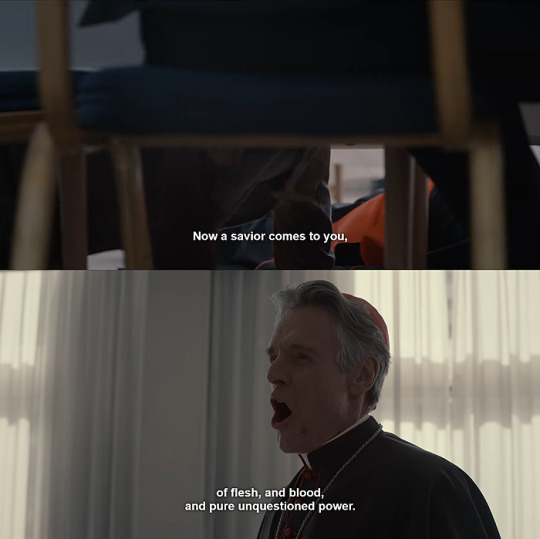

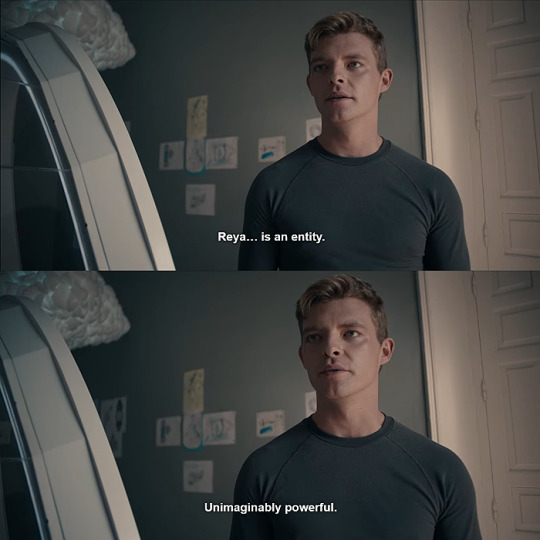
Whether these men mask their fascination with power through other words or not, theirs is a cause which easily calls for violence and a willingness to kill or die for it.
Earthly power inspires Francesco Duretti to have the current halo bearer killed if need be as he attempts to consolidate his bid on the Holy See; Kristian Schaefer would sacrifice the world as readily as he does his old acquaintance Duretti in the name of this power that lay entombed for a thousand years but communicated through the voice of a sick little boy; cardinal William Foster is inebriated with the idea of being a new god's right-hand man, so he brutally slaughters his colleagues to buy himself a place at Adriel's table, even if that means getting no more than his master's crumbs; father Vincent is so eager to find someone or something powerful enough to take the burden of "his darkness" from atop his shoulders that he convinces himself of there being divinity in the parlour tricks of a manipulator, killing a symbolic daughter in this trickster's name; Adriel would bleed humanity dry without a second thought all the while claiming to save it in draining its belief for the benefit of his own megalomania; finally, Michael subjects himself to the will and authority of Reya, whom he claims to be "unimaginably powerful".
Of course the women of Warrior Nun are mostly all ready to lay down their lives for their own cause as well, or else we wouldn't have their iconic motto of "in this life or the next", but the motivation behind it is what sets the men and the women wholly apart here. If the former are intoxicated by the concept of power, the latter are embedded in a family of sorts, in a dense network of relationships that they can identify with some ease, and which informs their decisions and actions more than just dogma or theory.
Most if not all of the female characters struggle between two different stances: one is an offshoot of the males' abstract organisation of the world, while the other is a more "hands-on", "organic" order; between "duty", or what is said to be their duty, and that which their own perception reveals, their "personal" logic by which the "self [is] delineated through connection", seeing one another as actual sisters instead of mere pieces upon the church's chess board. We see the dilemma take place within Beatrice, Camila, Lilith and Mother Superion, who are all faced with a choice of sticking to their place in a well-defined (artificial, abstract) structure or valuing instead the human connections all around them and that stand in opposition to this man-made categorisation of life.
And, one by one, they take the side of that one character who seems to have kept her lucidity and fidelity to her own understanding through it all: Mary.
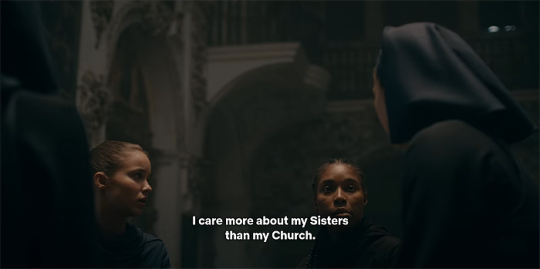
Mary never lost sight of her priorities. Her focus on friends and sisters illustrates Gilligan's point rather well when she is the only one who insists on understanding what happened to Shannon all the while the OCS is made to concentrate its energies on the halo instead. Of course it blinds her to Vincent's betrayal, but that is his fault more than it is hers; her moral compass points at the right direction for the most part.
And, each at their turn, the nuns adopt (rediscover?) this same mode of thought. Beatrice's efficient, obedient soldier façade crumbles beneath the urgency of siding with Mary rather than following the arbitrary decision of some man invested with the power of an institution; Camila outright admits wanting to be kicked out of the church just so she can stay near to the people who represent her allegiance more than liturgy itself ever could; Lilith literally travels to hell and back to rejoin her sisters, regardless of how her subsequent mutations upset her loyalty later on; Mother Superion sheds her prominence within hierarchy, risking it all, by standing with "her girls". Even Ava, an outsider with no ties to the church but who so desperately wanted to "live", trades a vague, abstract notion of what "life" and "freedom" entail for the very definite, tangible reality of the family this group of women becomes for her.
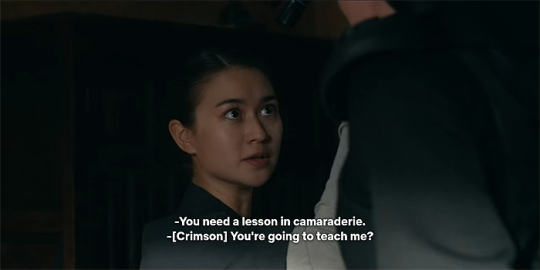
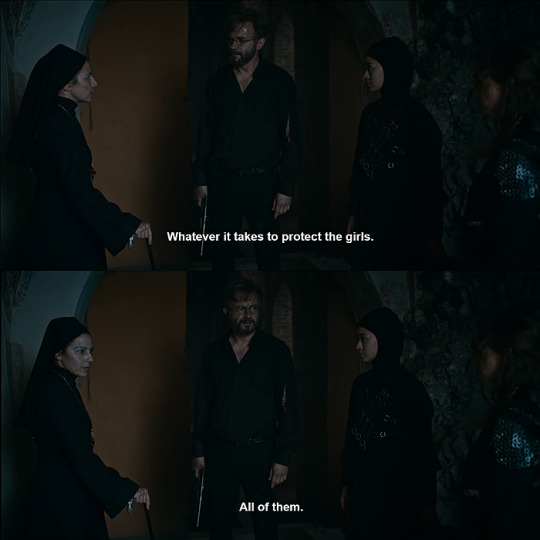
Another outsider equally stuck between "bodiless" logic and the reality of human connection around her, Jillian Salvius, too, falters before choosing her side when faced with these two points of view: that of "pure" reasoning and that informed by the consciousness of surrounding relationships. Her quest for "knowledge" is not sufficiently strong so as to potentially sacrifice someone in her inner circle. Season one has her holding young Michael back from stepping into the machine she herself had created for this purpose when concern overrides calculation; season two gives us a powerful scene where she is tempted by Kristian into joining Adriel's ranks as he claims she is already a part of it all and dangles before her the forbidden fruit of the world's hidden laws, the elusive answers the scientist in her has always searched for. He tries to hook her in by simultaneously appealing to her intellectual interests as well as her understanding of the web of relationships when he claims she is another link in the chain that leads to Adriel...
And Jillian refuses him.
Kristian would never convince her of already being within this specific network of relationships because he was the one to rupture it first.
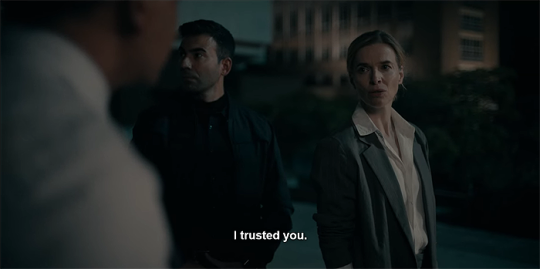
To these women, unlike the men, it's not about ideas — or, rather, about rationalisations, given how their interpretation of what is logical or reasonable is more than open to inquiry. To these women, it's not about loud, large but empty words vulnerable to tampering and shifting meanings; it's not about power.
It's about people.
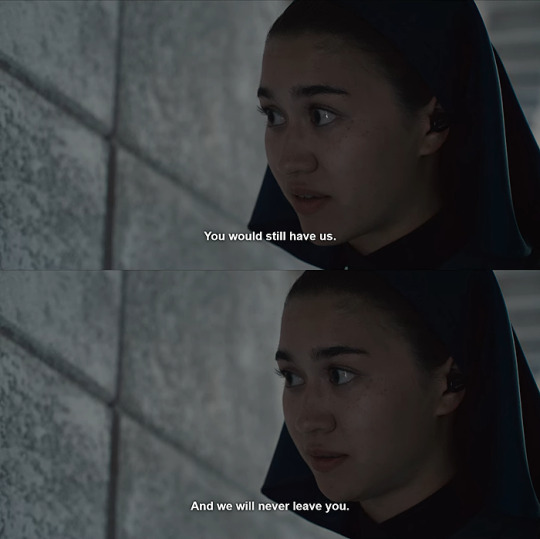
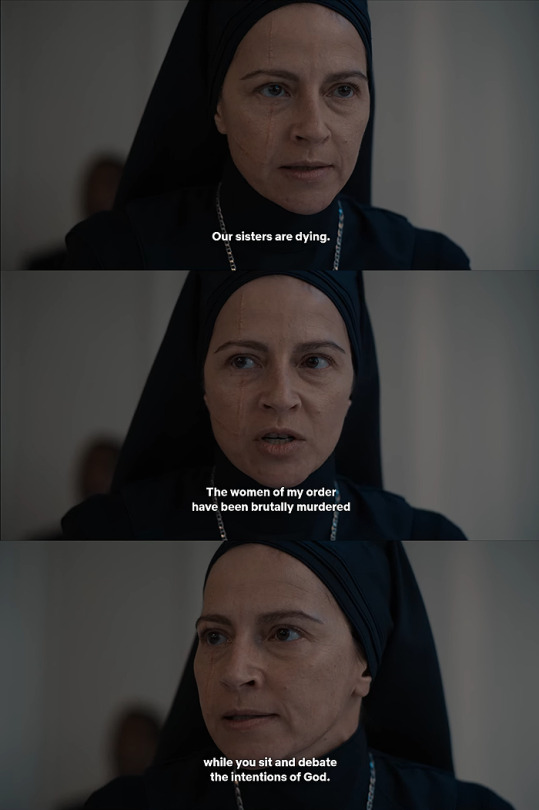

Rosemarie Tong says "Gilligan believed that women's moral development takes her from an egocentric, or selfish position to an overly altruistic, or self-sacrificing position and, finally, to a self-with-others position in which her interests count as much as anyone else's" — and this seems to describe perfectly well the inner trajectory that these characters follow. We see traces of the selfish in Ava, Jillian and Lilith, as well as of the self-sacrificial in Beatrice or Suzanne, but they all appear to converge on this path towards constructing a "self-with-others" whereby they are all individuals inextricably tied to one another — and aware of it, acting accordingly. A sisterhood, a direct sisterhood that supersedes the very church structure which facilitated it to begin with.
Of course Warrior Nun is too intricately built to allow itself to be so smoothly explained; if Carol Gilligan provides a framework that helps us to identify what is so positive and deserving of attention in the female characters' attitudes as championed by one of the show's own writers, it also falls short on other points and her propositions can then be questioned by the show in turn.
We need but a few examples.
If Jillian Salvius values the significance of association with others more than she does a cold, distant overview of things (the latter being the stereotypical scientist attitude), then how is it that she seems so prepared to immolate Lilith at the altar of curiosity? One relationship takes precedence over the other, yes, and we cannot compare the love for a son to whatever affection or respect there is for anyone else, but the nature of Jillian's experimentation with Lilith, had it gone forward, is quite brutal even for the sake of a debilitated child. Jillian's stance is understandable, but this "self-with-others" thing isn't as clear-cut as we might think.
Lilith herself oscillates between those three positions of moral development described by Gilligan, going from selfish to "connected" by the end of season one, but ending season two in almost complete isolation, with only a hint towards her previous place in a web of sisters as she aids Beatrice in getting Ava to the ark... Shortly after having dug her claws into the warrior nun's flesh.
But perhaps Lilith is a more special case than we realise at first. Our early childhood experiences define much of our character, after all, and the words we use have a bearing on how we view and reconstruct the world in our discourse; Lilith's understanding of the relationships between people, of "family", probably doesn't reflect that of her sisters given the ill-treatment she must have received from her relatives. If one's primary web of relationships is so tainted, what model can it ultimately provide for later connections? Just as Ava's mistrust for nuns is justified by her previous, negative experiences at their hands, Lilith's experience with intimate or familial bonds surely affects her maturing sense of being linked to other people. If family is a positive value for Ava and Mary, for example, it cannot boast of the same meaning for Lilith, whose family is a source of stress and misunderstanding rather than a harbour of love.
The treatment she has received might have corrupted her grounds for moral judgment by communal lenses in a way Beatrice's rejection by her own parents did not, leaving Lilith adrift as long as she does not somehow attempt to re-signify what human connection ultimately means. To Lilith, as of yet, the web of relationships she necessarily belongs to mirrors the initial disposition she was brought up in, as a hierarchical structure where every link is tainted by the stench of power and domination — the OCS is a family much like her own... Where orders are given and meant to be obeyed.
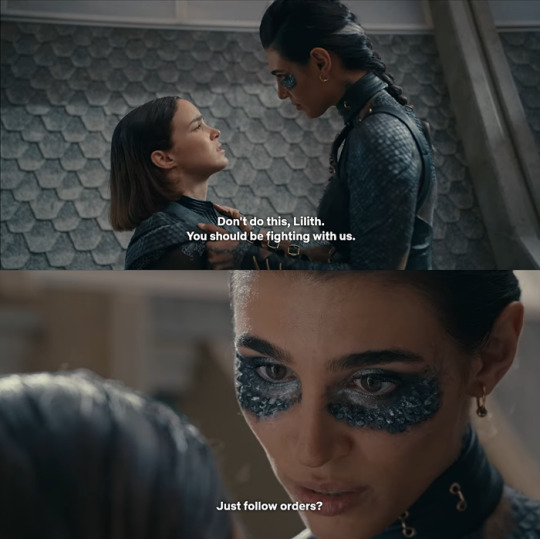

We cannot know for certain what it is that she sees or feels after Adriel "unlocks" her wraith-vision, but there is something peculiar in how, reflecting this idea of abstract versus material views of the world we've been discussing, Lilith claims to see reality when she casts her eyes upon the nebulous demonic figures only few others can see. In her opposing traits are mixed, delivering a strange synthesis we cannot quite make out yet and making Lilith a hybrid both in body and in thought.
And while this fact alone seems to interrogate David Hayter's comment about how the women in the show tend to be correct, we can further complicate the statement by glancing at Reya.
There is frightfully little we know of her, but a lot of the information we do have is conflicting: Reya is unimaginably powerful, yet needs to manipulate two young people to do her bidding for her in fighting Adriel; her predictions are "meant to be" yet do not manifest in the way they were said to; she is described as some sort of benefactor by taking Michael in, but she sticks a bomb into his chest and the very sight of her sends him reeling; she is, as far as we know, a woman, yet she might very well be at odds with the other women we see in the show. How, then, are the women always right?
Perhaps they are so when following their conscience as guided by their understanding of community and sisterhood, when belonging to a network of relationships and acknowledging it. That would exclude a murderous sister Frances, a confused Lilith and a mysterious, distant Reya from the definition.
In this sense, then, even if the characters are not static or simple, even if they waver between the moral positions suggested by Gilligan and which do not seem all that definite to begin with, her text is still enlightening as relates to why the women are, "word of God", the moral touchstone of Warrior Nun.
Having been robbed of further development of the story and universe for the time being, however, precisely because of an abstracting, impersonal corporate logic that sees only numbers where there should be people and the wonderful effect this show has had on them, there is only so much we can conjecture on this subject...
#warrior nun#analysis and similar#exercises in observation#i should tag all of the characters since they're all more or less discussed but i am too lazy for that sorry#i can't explain why i took so long to write this it's been in my essay list forever. then the david hayter revelations hit#and i knew i had to finally write it strengthened by his words#it's fair to tell you i have about a trillion reservations about psychoanalysis and psychology and whatever#but you also know by now i'm a pragmatist. if the theory helps me explain something i will use it.#then again i suppose i should have read gilligan's entire book lol but my eyes wouldn't have survived#i had read her text in january of last year i think because it's in a collection of feminist texts i own in print#so yeah. grain of salt etc#i'm not sure i've properly exposed what i wanted to say but i've had enough of this text and i'm releasing it into the world lol
26 notes
·
View notes